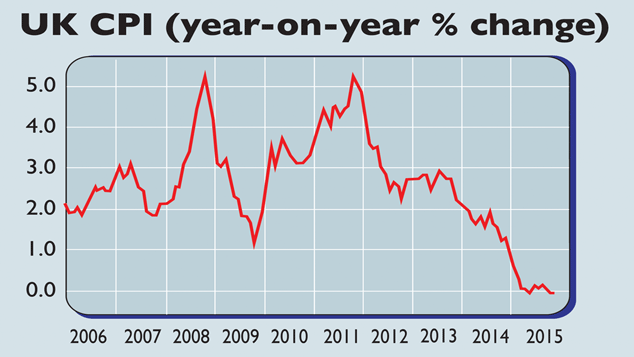Another month of deflation
The annual rate of consumer price inflation (CPI) held steady at -0.1% in October, the lowest since 1960.

Get the latest financial news, insights and expert analysis from our award-winning MoneyWeek team, to help you understand what really matters when it comes to your finances.
You are now subscribed
Your newsletter sign-up was successful
Want to add more newsletters?

Twice daily
MoneyWeek
Get the latest financial news, insights and expert analysis from our award-winning MoneyWeek team, to help you understand what really matters when it comes to your finances.

Four times a week
Look After My Bills
Sign up to our free money-saving newsletter, filled with the latest news and expert advice to help you find the best tips and deals for managing your bills. Start saving today!

The annual rate of consumer price inflation (CPI) held steady at -0.1% in October, the lowest since 1960. Lower food and alcohol prices, and the effects of higher tuition fees dropping out of the annual calculation, offset the strongest October rise in clothing prices since 1997. According to Citigroup's Michael Saunders, Britain is on track for its lowest annual inflation rate since 1933 this year: 0.1%. Core inflation, which strips out volatile food and energy prices, ticked up to 1.1% last month. Producer price inflation stood at -1.3%.
What the commentators said
The main reason for this bout of deflation is collapsing commodityprices, abetted by the recent strengthin the pound, rather than a lack of domestic economic momentum that becomes self-perpetuating. For instance, there is no evidence of changing consumer behaviour. "No one is goingto delay their weekly trip to the supermarket or stop filling up their car's petrol tank because they expect prices to fall next month," said Currie. "You need to eat and get to work."
Indeed, this is a bout of "good deflation", raising households' spending power. Consumers are "enjoying real-terms wage rises after years of pain", said Russell Lynch in The Independent. Wage growth near a six-year high, low unemployment and a healthy housing market all bode well for consumption, which comprises 60% of GDP.
MoneyWeek
Subscribe to MoneyWeek today and get your first six magazine issues absolutely FREE

Sign up to Money Morning
Don't miss the latest investment and personal finances news, market analysis, plus money-saving tips with our free twice-daily newsletter
Don't miss the latest investment and personal finances news, market analysis, plus money-saving tips with our free twice-daily newsletter
In any case, inflation is likely to rise again soon, as the recent oil pricedeclines drop out of the annualfigures. According to Bank of America Merrill Lynch's Rob Wood, petrol price inflation is set to climb from -14% to 0% by February.
Meanwhile, negative producer price inflation is unlikelyto be enough to prevent core inflation climbing next year, said SamuelTombs of Pantheon Macroeconomics: retailers are raising prices to make up for big increases in labour costs. CPI could thus reach the Bank of England's 2% target by late 2016, "compelling" it to raise interest rates faster than the markets expect.
Get the latest financial news, insights and expert analysis from our award-winning MoneyWeek team, to help you understand what really matters when it comes to your finances.

-
 Inheritance tax investigations net HMRC an extra £246m from bereaved families
Inheritance tax investigations net HMRC an extra £246m from bereaved familiesHMRC embarked on almost 4,000 probes into unpaid inheritance tax in the year to last April, new figures show, in an increasingly tough crackdown on families it thinks have tried to evade their full bill
-
 Average UK house price reaches £300,000 for first time, Halifax says
Average UK house price reaches £300,000 for first time, Halifax saysWhile the average house price has topped £300k, regional disparities still remain, Halifax finds.